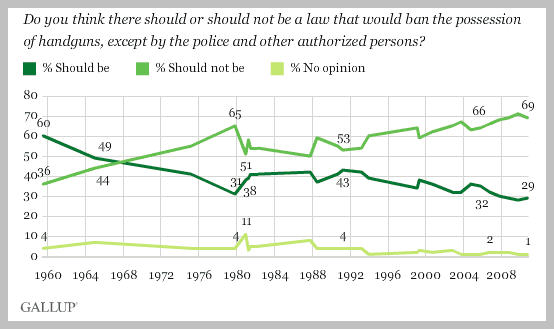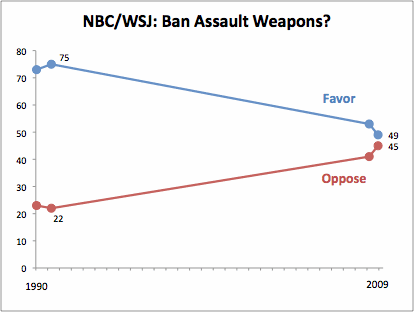As soon as I hear the words “Gun control” I cringe. This is because the opponents of Gun Control have been able redefine it as denial of any gun bearing rights whatsever, So the NRA advance the thinking that if you cede any control or regulation of firearms – that will be the thin edge of the wedge as opponents of gun usage will try to impose ever more draconian limits. So it is not a surprise that for many NRA and gun advocates, gun control has become a single factor issue in determining their electoral votes in both Sate and Federal elections. This has been the source of the NRA’s power – a constant under siege mentality.
Yet if one looks at recent polling on Gun Control done by Gallup just last year it appears that many aspects of gun control have diminished in popularity and private gun ownership is a settled issue.
As this Pew Research poll shows there is dwindling support for controlling gun ownership in the US over the past 20 years. As previously noted, the Pew definition is “control gun ownership”. This is quite general and does not catch the subtleties of the controlling availability of firearms, various ammo and addons plus how to limit criminal elements from getting easy access to firearms and ammunition. But it does show a softening of any outright ban against gun ownership.
The next chart shows this sentiment explicitly:
Banning of handguns except for police and authorized persons has dropped from 60% in 1960 to 29% in 2009. Again the conditions are draconian – only “authorized persons and police”. This simply does not get support.
But even bans against assault weapons, not exactly the firearm of choice of hunters or even the self defense weapon of choice has seen a dramatic drop control:
In this NBC/Wall Street Journal poll there is still a small plurality in favor of banning assault weapons. This decline in public support of broad gun controls has been compared to the softening of support for banning gay marriage. It is a new whatever generation. But the inexorable decline of the crime rate, even through the 2007-2010 years has seen violent crime follow a rollercoaster down in recent years after a huge uptick from 1960 thru 1980 to 1990:
| US Crime Rates | |||
| Year | Total Crimes | Violent Crimes | Murders |
| 1960 | 3,384,200 | 288,460 | 9,915 |
| 1980 | 13,408,300 | 1,344,520 | 23,040 |
| 1990 | 14,475,600 | 1,820,130 | 23,404 |
| 2000 | 11,608,072 | 1,425,486 | 15,586 |
| 2005 | 11,565,499 | 1,390,745 | 16,740 |
| 2006 | 11,401,511 | 1,418,043 | 17,030 |
| 2007 | 11,251,828 | 1,408,337 | 16.929 |
| 2008 | 11,160,543 | 1,392,628 | 16,442 |
| 2009 | 10,762,956 | 1,325,896 | 15,399 |
| 2010 | 10,329,135 | 1,246,248 | 14,748 |
| Source: FBI Uniform crime Report | |||
The trend on a per capita basis shows an even steeper decline because crime numbers are falling even as the US population is increasing. In sum, with crime declining people feel less concerned about firearms getting in the hands of criminals.So concern about gun control appears to be on the decline.
The Counter Trends
Frank Luntz, the GOP pollster recently did a ssurvey of NRA members that if confirmed by other surveys shows a marked change in attitudes among NRA members. Unlike their NRA Leadership, NRA members resoundingly support many common sense limitations on firearms acquisition and use.
Among the survey’s key findings:
- 87 percent of NRA members agree that support for 2(nd) Amendment rights goes hand-in-hand with keeping guns out of the hands of criminals.
- There is very strong support for criminal background checks:
- 74 percent support requiring criminal background checks of anyone purchasing a gun.
- 79 percent support requiring gun retailers to perform background checks on all employees – a measure recently endorsed by the National Shooting Sports Foundation, the trade association for the firearms industry.
- NRA members strongly support allowing states to set basic eligibility requirements for people who want to carry concealed, loaded guns in public places. By contrast, the NRA leadership’s top federal legislative priority – national reciprocity for concealed carry permits – would effectively eliminate these requirements by forcing every state to allow non-residents to carry concealed guns even if they would not qualify for a local permit.
NRA members support many common state eligibility rules for concealed carrying:
- 75 percent believe concealed carry permits should only be granted to applicants who have not committed any violent misdemeanors, including assault.
- 74 percent believe permits should only be granted to applicants who have completed gun safety training.
- 68 percent believe permits should only be granted to applicants who do not have prior arrests for domestic violence.
- 63 percent believe permits should only be granted to applicants 21 years of age or older.
The NRA rank and file also supports barring people on terror watch lists from buying guns (71 percent) and believe the law should require gun owners to alert police to lost and stolen guns (65 percent).
The NRA’s Washington office strongly opposes both measures.
The Luntz findings are in line with previous research showing that Americans are nearly unanimous in their support for closing loopholes that allow dangerous people to buy firearms without a background check. A January 2011 poll conducted for Mayors Against Illegal Guns by the bipartisan polling team of Momentum Analysis and American Viewpoint found that 86 percent of Americans and 81 percent of gun owners support requiring all gun buyers to pass a background check, no matter where they buy a gun or who they buy it from.
In sum, these results show that how the NRA Leadership is seriously out of step with its members. Now add to this growing friction between the NRA Leadership and the Republican Party. The Associated Press is reporting the story of how the NRA has been attacking GOP legislators in Idaho , North Carolina and Tennessee. For example, in Tennessee, the NRA is spending $75,000 to help defeat GOP Representative Debra Maggert. Now $75,000 is equal to more than half of all the funds that Debra Maggert has for her campaign. Similar efforts are being conducted against GOP candidates and/or positions in Alabama, Georgia, Idaho, and elsewhere.
Bussiness Week describes the ambiguity of the Gun Control situation. On one hand it appears to be a rare example of bipartisanship as 27 Democratic Senators ” have joined with Republicans as formidable opponents to recent gun-control initiatives. In 2009, they approved allowing checked guns on Amtrak rail cars and easing restrictions on guns in national parks.” But then Business Week describe howthe NRA, seemingly triumphant in suppressing any call for Gun Control after Aurora has nonetheless encountered some real setbacks in Virginia, Alabam, georgia and elsewhere. Also, the amount of money at NRA’s disposal is becoming less and less in comparison to SuperPAC and other lobbying amounts available to candidates. In sum, the NRA is becoming more vulnerable to attack from within its two bases – NRA members and the Republican Party. And if the NRA gets called out – there will be significant support among its members for Common Sense gun limitations. A welcome change.as it appears Common Sense Gun Control is not dead as legitimate gun ownership becomes broadly accepted while tolerance of firearm misuse diminishes ever more.



